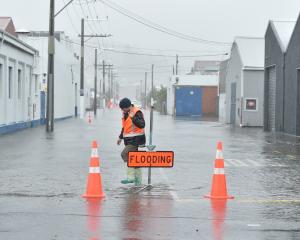He recently returned from a 23-day educational tour of Peru where he visited craft and coffee producers who work in partnership with Trade Aid.
For the past two and a-half years he has worked for the organisation in Dunedin, firstly as a volunteer and now as the assistant manager and education co-ordinator.
The trip allowed him to meet the people who create the items he promotes and sells.
"It really does connect you to what you put on the shelves, what you price, and what you believe in," he says.
He became hooked on the movement which "ballooned" in the United Kingdom, but it was not until he moved to New Zealand five years ago that he really became involved.
For him, the ability to help people comes down to simple, everyday decisions.
"You can make a difference every day by choosing what you buy and where you have your coffee.
"Coming back from Peru really brought that home."
After applying to be part of the trip and organising funds to get himself there, he and a group of nine others set out from Santiago in May for their eye-opening tour.
Their first stop was at the headquarters of Minka Fair Trade.
Established in 1976, the organisation sells products in 30 countries but has the longest-running partnership with Trade Aid.
More than 3000 people produce goods under the co-operative's banner and the group visited four villages which specialise in different items.
"Everyone was glued with their eyes to the bus windows, watching the world go by."
In a slum in Lima they saw how musical instruments were meticulously constructed, in Pisac they met families making whistles, and on the desolate altiplano of the Andes they learnt how alpaca wool is transformed into luxuriously warm accessories and clothing.
The other partner they met was Cenforcafe, a co-operative established in 1999.
With 2091 producers, living in 12 districts in northern Peru, the group prides itself on producing top-quality beans without the use of chemicals.
While in Piura the group was put to work harvesting and processing beans, getting a taste of the painstaking process.
On their travels, the group stayed at Minka's headquarters and basic hotels, but the greatest insight into people's lives came from homestays.
"It's really interesting to get an awareness of how people were living," Mr Butler-Peck says.
They stayed in mud-brick homes with no electricity and no running water.
Food was simple, with potatoes, corn and guinea pigs making up the bulk of pantries.
"It really made you think about how lucky you are. They have almost nothing."
However, everywhere he went he saw smiling faces. The warm, "beautiful" Peruvians treated them "like family" and floored them with their simple aspirations.
One group walked for three hours to meet them and dancing was essential everywhere they went.
One person he spoke to was prepared to wait 10 years for trees to grow and be turned into timber to build a house, another who was unable to go to university was incredibly proud his children were able to attend, while many dreamed of one day plastering the walls of their house.
They all spoke of how fair trade had changed their lives.
Opportunities are "coming alive" for children who often had no education above primary school from an education system that is the second worst in the Americas, Mr Butler-Peck says.
Many have hopes of following in their parents' footsteps because they know there is a future in fair trade.
Mr Butler-Peck was often told of how communities or families would not exist if it were not for the opportunities Trade Aid and fair trade in general offered.
So far, he has shared his experiences with pupils at some Dunedin schools and a Rotary group, with more talks planned before the end of the year.
As future leaders, it is important for young people to be informed about fair trade and social justice and to connect that with what they buy, he says.












